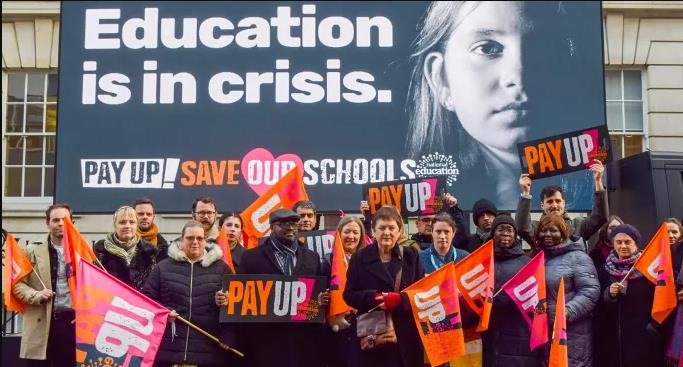August 21, 2023 - No. 45
Negotiations in K-12 Education in Ontario
Ontario Teachers' and Education Workers' Unions to Hold Strike Votes
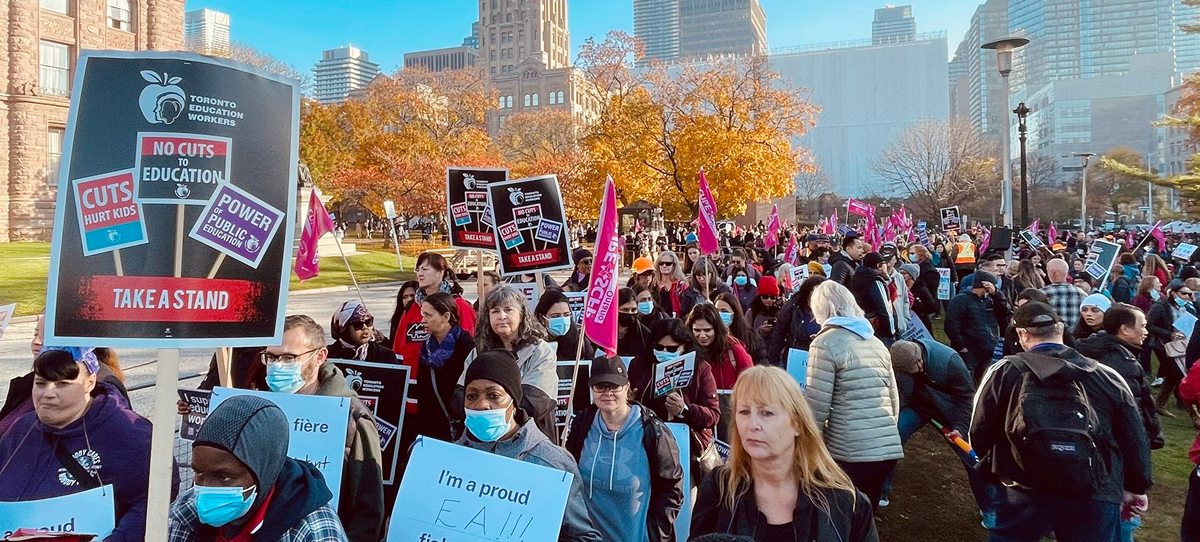
Politicial
days of action of education workers represented by CUPE-Ontario School
Board Council of Unions at Queen's Park, November 4, 2022, and
broad moilization force government to rescind anti-worker Bill 28 and
negotiate a contract.
• A Way Forward Can Be Found by Refusing to Submit to Dictate and Addressing Conditions in Schools
Education in Britain
• An Important Landmark in the Teachers' Struggle to Defend Their Rights and the Future of Education
Negotiations in K-12 Education in Ontario
Ontario Teachers' and Education Workers' Unions to Hold Strike Votes
 All
teachers in the K-12 publicly funded education system in Ontario and
many education workers have been without a new contract since August
31, 2022 when their previous contract expired. The previous contract
was negotiated under the conditions of the Ford government's
unconstitutional wage-suppressing legislation, Bill 124, and then the
start of the COVID-19 pandemic in which teachers and education workers
unions paused strike actions that were underway province wide to
respond to the conditions of the pandemic.
All
teachers in the K-12 publicly funded education system in Ontario and
many education workers have been without a new contract since August
31, 2022 when their previous contract expired. The previous contract
was negotiated under the conditions of the Ford government's
unconstitutional wage-suppressing legislation, Bill 124, and then the
start of the COVID-19 pandemic in which teachers and education workers
unions paused strike actions that were underway province wide to
respond to the conditions of the pandemic.
To date, only education workers represented by CUPE-Ontario School Board Council of Unions (OSBCU) have been able to achieve new collective agreements acceptable to them following their refusal to submit to the Ford government's use of the notwithstanding clause to impose a contract by force. This refusal showed that it is possible to go beyond the limitations the government and the courts attempt to impose on workers' actions and thinking about what is and isn't possible or legal.
Since that time, the Ford government has refused to negotiate substantive issues with the remaining unions that represent teachers and education workers. Meanwhile it has been making changes to the powers of locally elected school boards, putting them more directly under the control of the Minister of Education. As well, it has been changing graduation requirements for secondary students, releasing new curricula, and recently dictated that elementary students from kindergarten to grade two will be subject to a new province-wide testing regime for reading. All of this has been done without consultation, let alone negotiation, with either school boards or teachers' and education workers' unions.
At the same time, the government has refused to accept the November 29, 2022 ruling of the Ontario Superior Court of Justice on anti-worker Bill 124, the Protecting a Sustainable Public Sector for Future Generations Act, 2019, that suppressed wages in the public sector by dictating one per cent limits on annual compensation increases outside of any legitimate negotiated process. Justice Markus Koehnen concluded that Bill 124 was unconstitutional and declared it "void and of no effect." He argued forcefully that the government had not engaged in good faith bargaining and that its legislation had caused serious damage to Ontario's public services and, by extension, those who rely on them. At the request of the parties, the court had deferred the consideration of any remedy to a future hearing.
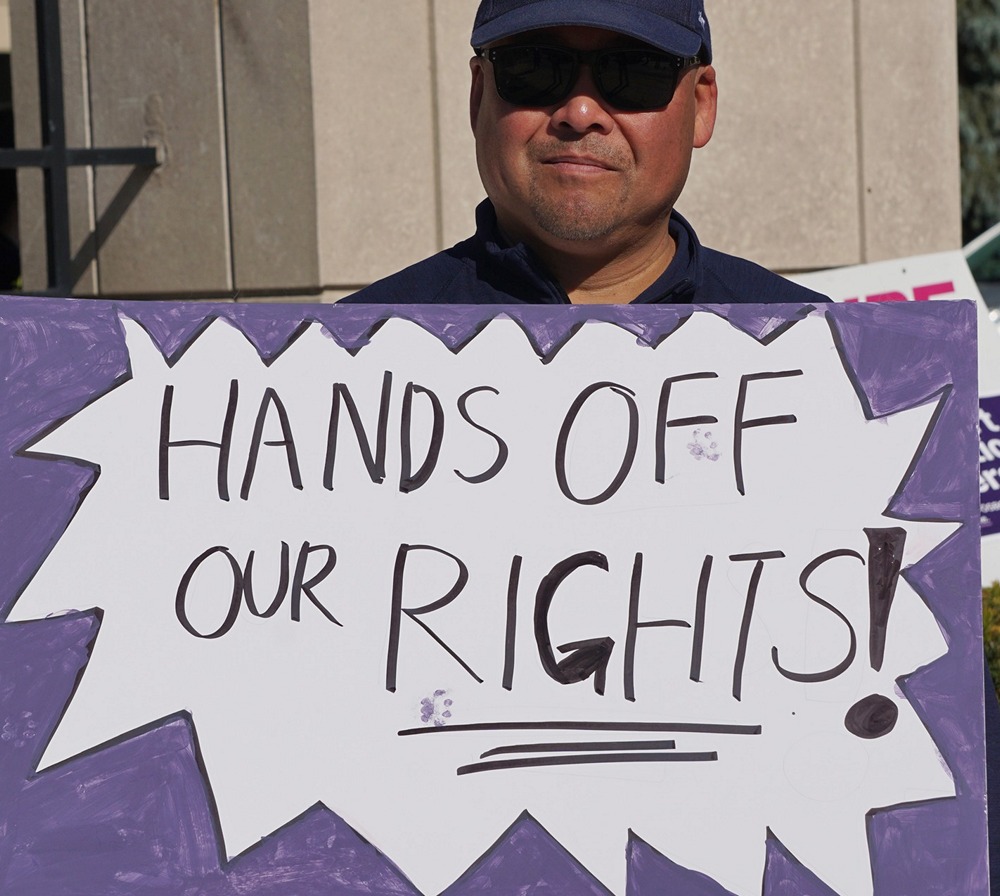 Shortly
after, the Ontario government filed an appeal of the decision that was
heard June 20-23. No timeline was established for when the decision
will be rendered.
Shortly
after, the Ontario government filed an appeal of the decision that was
heard June 20-23. No timeline was established for when the decision
will be rendered.
In its factum for the appeal, the government gave the spurious argument, among other things, that Bill 124 didn't violate Section 2(d) of the Charter of Rights and Freedoms in part because its limits on bargaining were "time-limited," as if this justified the widespread violation of rights. The government also argued that if Bill 124 did limit bargaining, the Court should still have deferred to the government on a matter of substantial public policy. Justice Koehnen argued that the government had not made a legitimate case for a financial crisis to justify the legislation given its pursuit of tax cuts for large companies at the same time it claimed it must limit public spending.
With its appeal the government is trying to make a case that it can do as it pleases and operate outside of the existing constitutional arrangements because a) it is only temporary and b) it is the government and irrespective of the legitimacy of its rationale should be able to do as it pleases without anyone having any recourse to the courts. None of its arguments convince anyone, however it is using its power to try and circumvent being held to account at the same time that it is once again refusing to negotiate in good faith with teachers and education workers.
With the school year set to begin September 5 in Ontario, and with the government engaging in such dishonourable schemes, two unions representing teachers and education workers, the Ontario Secondary School Teachers' Federation (OSSTF) and the Elementary Teachers' Federation of Ontario (ETFO) -- have announced that they will hold strike votes in early fall if the government continues refusing to negotiate. The strike votes will be held after mass meetings of the unions to inform their members of the state of bargaining and why they feel a strong mandate for strike action is required. ETFO has announced that these meetings for its members will begin mid-September after the start of school putting them in a position to take strike action if an agreement cannot be reached through negotiation. Since the announcement of the strike votes the government has agreed to new bargaining dates with some of the unions during September.
At ETFO's annual meeting August 14 to 17, union president Karen Brown explained that the changes being made to education by the Ford government are reminiscent of those made by the Harris government in the 1990s. Those changes resulted in teachers and education workers organizing the largest political protest and strike in North America which forced the government to back down on its vicious assault on school boards and education. She noted that the Harris government cut $1 billion from education as part of its restructuring, and today the Ford government "has cut $2.5 billion out of public education in real dollars since the 2018-2019 school year, all while sitting on $22 billion in unspent funds."
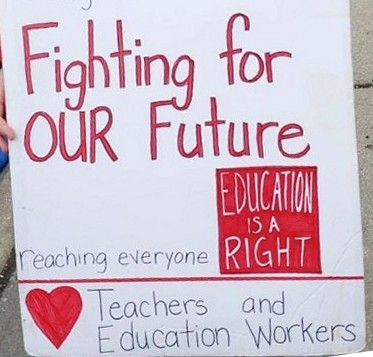 This
shows that the overall aim of the restructuring is to remove public
funds from education, which the government in power then uses to pay
the rich in various ways. The resistance to these attacks by teachers
and education workers is, in fact, a matter of preventing the theft of
public funds for private gain. Brown emphasized that in the past year,
the entire labour movement stood with education workers in saying No!
to the use of Bill 28 to impose contracts and invoke the
notwithstanding clause and that this is what forced the government to
back down.
This
shows that the overall aim of the restructuring is to remove public
funds from education, which the government in power then uses to pay
the rich in various ways. The resistance to these attacks by teachers
and education workers is, in fact, a matter of preventing the theft of
public funds for private gain. Brown emphasized that in the past year,
the entire labour movement stood with education workers in saying No!
to the use of Bill 28 to impose contracts and invoke the
notwithstanding clause and that this is what forced the government to
back down.
In a bargaining bulletin to its members, OSSTF notes that the annual
Grants for Student Needs, the mechanism for funding school boards based
on enrollment and facilities, has fallen by $1,200 per student when
adjusted for inflation since the Ford government took power in 2018.
The
bulletin adds, "Much might be said about the need for stability in
schools in these upcoming weeks: the fact is that it is the daily
contributions of OSSTF/FEESO members and other teachers and education
workers across the province that provide stability to Ontario's
students. Future stability, however, requires that this government
provide the resources necessary to ensure schools are staffed by
qualified teachers and education workers. The Ford government continues
to starve the education system of funding for the supports, programs
and professionals that students need to meet their full potential. In
addition, this government's approach of implementing initiatives at the
last minute and ignoring the input of parents and education
professionals is the opposite of stability."
Ontario teachers and education workers have learned through their own experience that the only way to establish a pathway to a negotiated agreement which recognizes their rights is by refusing to submit to dictate and threats.
A Way Forward Can Be Found by Refusing to Submit to Dictate and Addressing
Conditions in Schools
The education workers of CUPE-Ontario School Board Council of Unions (OSBCU) broke new ground for the entire labour movement in November 2022, when they defied the Ford government's attempt to impose a contract using the notwithstanding clause of the Charter of Rights and Freedoms and by doing so violate their right to strike and negotiate. The education workers showed that it is by refusing to submit to dictate and the limitations used by the government and the courts to keep workers from taking action to affirm their rights that a path forward for negotiations can be established.
 In other words, in order to have negotiations
workers cannot accept dictate by the government -- which is in
fact part of the existing constitutional order. They
must act on the basis of the actual conditions in the schools and
their conscience which recognize that their
working conditions are students' learning conditions. By doing
this, they can win public opinion in support of their demands. It is the
conditions that determine what can and cannot and what must or
must not be done, not the dictate of the rich who declare that
public services must be cut and privatized so that the rich can
get paid.
In other words, in order to have negotiations
workers cannot accept dictate by the government -- which is in
fact part of the existing constitutional order. They
must act on the basis of the actual conditions in the schools and
their conscience which recognize that their
working conditions are students' learning conditions. By doing
this, they can win public opinion in support of their demands. It is the
conditions that determine what can and cannot and what must or
must not be done, not the dictate of the rich who declare that
public services must be cut and privatized so that the rich can
get paid.
The entire labour movement expressed itself as standing as one with CUPE-OSBCU's 55,000 education workers in their defiance of an imposed contract. Since then, this spirit has imbued advanced sections of the labour movement across Canada. The public servants of the Public Service Alliance of Canada who, despite government threats, went on strike to force the government to negotiate conditions of work that were being changed outside of negotiations; the striking Windsor Salt workers who continue to refuse the dictate of the company that is trying to smash their union; and the BC port workers who rejected a tentative agreement that did not correspond to their actual conditions and demands, are but a few.
The experience of forcing the Ford government to back down on its Bill 28 in November 2022 continues to guide Ontario teachers and education workers. Today they are finding a way forward in the face of the Ford and Trudeau governments' insistence that they must do whatever the international cartels demand to finance the electrification of the economy, including indebting the people and removing funds from public services. While they steal from public services and incur debt, these governments refuse to affirm the rights of workers to determine wages and working conditions commensurate with the actual conditions of living and work.
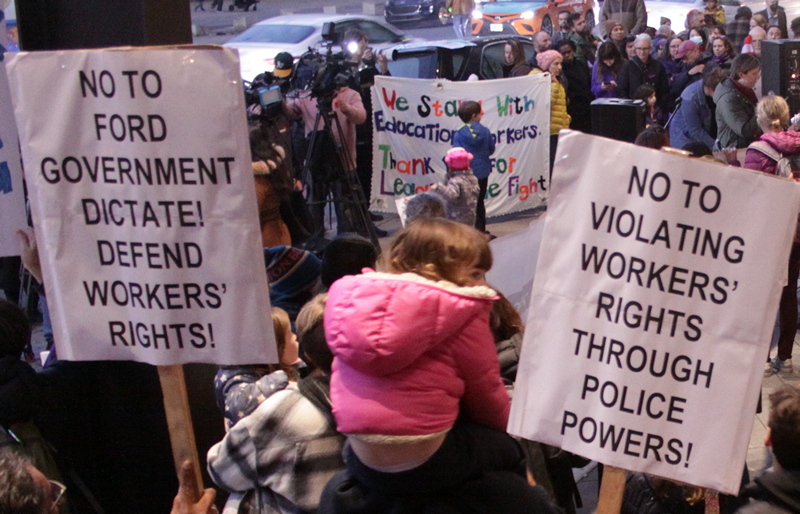
This shows what is meant by constitutional order: the rule of the rich that the workers are not permitted to question or resist. Ontario workers are in no mood to accept this status quo! Ontario workers want a constitutional order that has its basis in the actual conditions and corresponds to those conditions. Ontario workers want a constitutional order that affirms the right of all to an education, health care, recreation, etc. that is of the highest standard the society can provide and which sets standards that all governments must uphold as their duty.
By refusing to be limited by what the government with its constitutional order dictates, Ontario teachers and education workers can make further advances in uniting themselves, students, parents and everyone else to affirm the right to education and to a say over the direction of their society.
Education in Britain
An Important Landmark in the Teachers' Struggle to Defend Their Rights and the Future of Education
In February, over 100,000 teachers in England and Wales initiated their largest wave of actions in 30 years, holding eight days of strikes between February and July. Unions were demanding a fully funded pay increase due to rising inflation and ten years' worth of real-terms pay cuts. As well as a pay level that has fallen 23 per cent in real terms since 2010, leaving some teachers in desperate conditions, teachers cited excessive workload, rising class sizes, lack of access to support for special educational needs, a crisis in recruitment and retention of staff, schools that are in a state of disrepair to the point of real danger, and so on. Another issue has been the system of inspections carried out by the Office for Standards in Education (Ofsted).
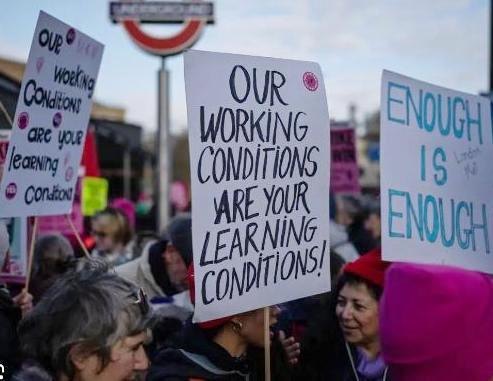 The
largest union representing teachers was the National Education Union
(NEU). The Teachers' Union (NASUWT) and school leaders from the
National Association of Head Teachers (NAHT) also joined the strikes
for the first time in the current dispute. It is the first time in its
125-year history
that NAHT members have taken strike action over pay.
The
largest union representing teachers was the National Education Union
(NEU). The Teachers' Union (NASUWT) and school leaders from the
National Association of Head Teachers (NAHT) also joined the strikes
for the first time in the current dispute. It is the first time in its
125-year history
that NAHT members have taken strike action over pay.
As the NEU explains, on July 13, the government published the School Teachers' Review Body (STRB) report on teachers' pay, recommending a 6.5 per cent pay rise from September.[1] The government has finally conceded to fully implementing the STRB recommendation. NEU, ASCL, NAHT and NASUWT members have now voted to accept the progress made and end industrial action, says the NEU.
The agreement stands for one year. It will be funded from external sources, as demanded by teachers. It is the unwavering strike action that forced the government to increase its offer, having initially rejected the STRB recommendations, and spend an extra £900 million to fund it and protect support staff jobs. However, it is important to note that salaries have not met the required level, so that the issue remains ultimately unresolved. [...]
 Throughout,
teachers faced a refusal to negotiate, imposition, and attempts from
the government to eliminate any say. They held the line in this
offensive, remaining united in self-defence to assert their No!
to dictate, speaking out about their conditions and refusing to be
silenced. A
challenge facing the workers' movement as a whole is how to organize
itself further so that it can put the justice of its cause into play to
favour its own interests. A realization has emerged that conditions
have changed and that working people must act in new ways.
Throughout,
teachers faced a refusal to negotiate, imposition, and attempts from
the government to eliminate any say. They held the line in this
offensive, remaining united in self-defence to assert their No!
to dictate, speaking out about their conditions and refusing to be
silenced. A
challenge facing the workers' movement as a whole is how to organize
itself further so that it can put the justice of its cause into play to
favour its own interests. A realization has emerged that conditions
have changed and that working people must act in new ways.
The strikes highlighted the importance of workers exercising their role in empowerment, control, and decision-making. Teachers had to put their organizations' weight behind their demands and establish talks and negotiations. The struggle for control over the future of education has opened up various key questions, but decisions at present remain firmly in the hands of elite powers and their government. The struggle for teachers to have a say over education and their conditions is still ongoing. The solution to the crisis lies with teachers themselves, and forms can and must be found to empower them to discuss and provide those solutions.
The struggle for a properly funded and modern education system has been ongoing for years, with teachers questioning the future of education that is being underfunded and undermined. People demand better schools and teachers' pay, and that the crisis in staff recruitment must be reversed. It is crucial to stop servicing and paying the rich, so that the necessary funding can be found to fully-fund vital services and social programs like education.
The crisis has exposed the importance of the future of education and the need for a solution that lies with the teachers themselves. These strikes have shown that teachers and the public alike are not willing to support cutbacks in education funding, which will not solve problems and ensure decent education is delivered as a right. Teachers and parents demand education as a right, as crucial to nurturing the modern human being.
Everyone has the right to the highest standard of education, and the paramount issue is how society should be organised to fulfil that right. Education itself plays a role in forming the conception that people have rights by virtue of being human. While the outcome of the recent strike struggle meets some demands, the wider need to meet the material and cultural requirements of the entire population remains on the agenda.
Teachers need to be recruited to the proper levels, with the appropriate support of auxiliary staff and assistants. They should be a decisive voice in determining how schools are run on behalf of the general population, not mixed up with narrow private interests that now permeate the system through arrangements such as Academies. A modern educational authority should have the aim of funding and facilitating the provision and development of education through the experience of the educators themselves. The curriculum should be decided based on who it serves and the needs and future of society.
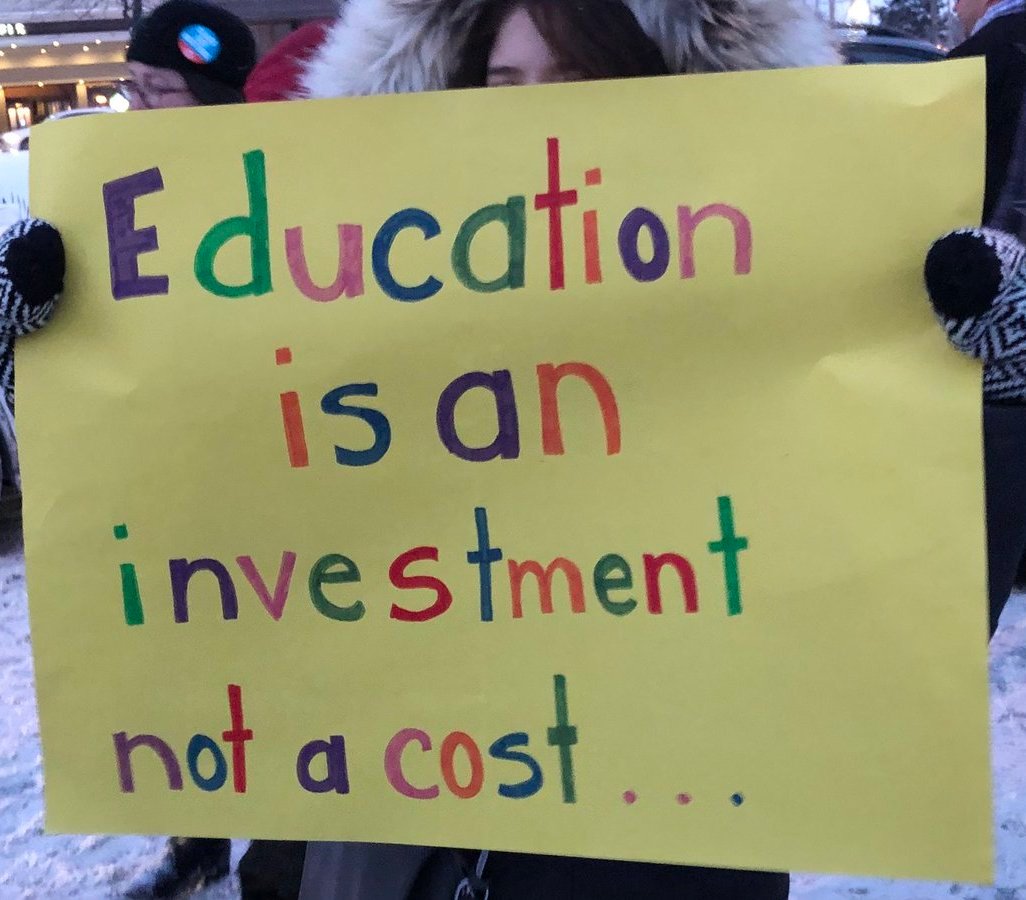 A
whole change of direction is required, away from the capital-centred
and towards a human-centred education system. Education is at the heart
of a new society, organized on the basis of guaranteeing the rights of
all and their material and cultural needs, as well as allowing workers
to control
their lives and livelihoods. This is what poses itself in terms of
education's unique relevance to the future of a society based upon
developing and releasing the human factor and social consciousness. It
is a world apart from the Old, as represented by the Department of
Education, Ofsted, and their
conception of "deliverology."
A
whole change of direction is required, away from the capital-centred
and towards a human-centred education system. Education is at the heart
of a new society, organized on the basis of guaranteeing the rights of
all and their material and cultural needs, as well as allowing workers
to control
their lives and livelihoods. This is what poses itself in terms of
education's unique relevance to the future of a society based upon
developing and releasing the human factor and social consciousness. It
is a world apart from the Old, as represented by the Department of
Education, Ofsted, and their
conception of "deliverology."
Society is facing a critical situation with increasing educational demands, including pressures on teachers, diminishing staff, pension attacks, poor salaries, and rising living costs. The decline of schools and colleges, lack of resources and funding, and media and Westminster politicians' slanderous behaviour are contributing factors to this dangerous catastrophe in the making. The teachers are preparing the strategy and tactics of their impending struggle as the government and the elite continue to prepare their attacks with destructive consequences. Teachers are dealing with the future of education right now. In declaring Enough is Enough, they are posing the alternative direction in which society must go.
This has been a year of real achievement for the teachers, and Workers' Weekly congratulates them on these achievements and their persistence in bringing about a resolution which favours them. It doesn't stop here. It is a year that can be built on in the future, with their recent struggles highlighting the importance of workers exercising their role for empowerment, control, and decision-making. Teachers will be ready to take the struggle for the future of education, and education as right, into a new phase.
Note
1. "Pay offer consultation results,", NEU, July 31, 2023
(rcpbml.org.uk, August 5, 2023)
(To access articles individually click on the black headline.)
Website: www.cpcml.ca Email: editor@cpcml.ca


